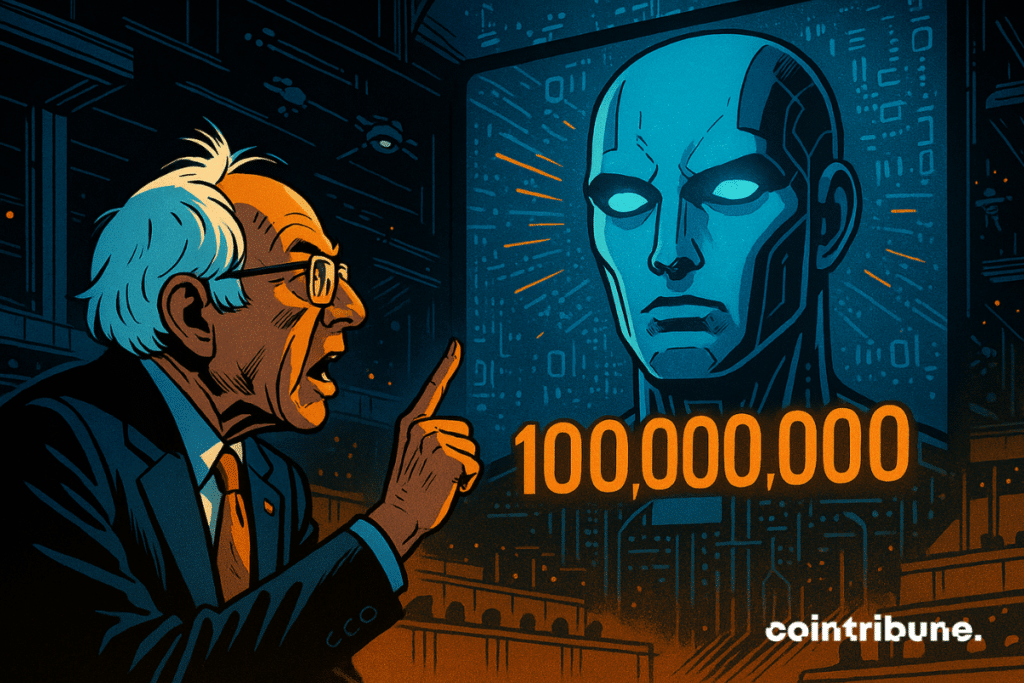Senate Report Reveals AI Job Loss Crisis
Artificial intelligence no longer just assists humans but now threatens to replace them on a large scale. Senator Bernie Sanders warns that nearly 100 million American jobs could disappear within ten years. In an official video supported by a senate report, he accuses tech giants of sacrificing workers for the sake of automation. For him, inaction in the face of this artificial labor revolution risks sharply worsening social inequalities.

In brief
- Bernie Sanders warns of a possible collapse in the job market, with up to 100 million positions threatened by artificial intelligence.
- A senate report details the sectors most exposed, such as fast food, accounting, and road transportation.
- The senator openly criticizes tech moguls, accused of favoring automation at the expense of workers.
- To counter this artificial labor revolution, Sanders proposes strong measures, including a robot tax and a 32-hour workweek.
A warning about the collapse of employment
While many see AI as the key to the future of Web3, US Senator Bernie Sanders issued a serious warning in a video published Wednesday on YouTube : “artificial intelligence could eliminate up to 100 million jobs in the United States over the next decade.”
Relying on a report from the Senate Committee on Health, Education, Labor, and Pensions (HELP), which Sanders leads from the minority side, this statement is worrying both in scale and precision.
The document, made public at the start of the week, uses OpenAI’s AI to analyze job market trends. Indeed, large portions of the economy are threatened by automation in the short term.
In a direct critique aimed at tech moguls, Sanders denounces massive investments by figures like Elon Musk, Jeff Bezos, Mark Zuckerberg, and Larry Ellison : “they are investing hundreds of billions to replace human labor. Is it because they want to improve the lives of the 60 % of Americans living paycheck to paycheck ? I highly doubt it”.
The report details the professional categories that are particularly exposed, especially those based on repetitive, logistical, or administrative tasks. Among the jobs threatened in the short term are notably :
- Fast food employees, facing the widespread adoption of self-service kiosks and robotic kitchens ;
- Accountants and administrative assistants, whose tasks can be absorbed by AI tools ;
- Truck drivers, a profession weakened by advances in autonomous vehicles.
Beyond these sectoral projections, the document places automation within a broader historical trajectory. Since 1973, the productivity of American workers has increased by 150 %, company profits by 370 %, while real wages have dropped by $30 per week.
“Building new factories will mean nothing if robots work there instead of people”, warns Sanders. In short, the report depicts a dynamic where technology increases margins without redistribution, feeding an already gaping economic divide.
Towards a political response : regulating AI to protect jobs
Bernie Sanders proposes a series of measures to stem the harmful effects of automation on employment. His plan is based on five pillars, the most emblematic of which is the establishment of a 32-hour workweek without a salary reduction.
He also calls for the creation of a “robot tax” for any company that replaces employees with machines, as well as a corporate governance overhaul, with 45 % of board seats reserved for employees.
“What we’re saying is that if companies profit from automation, workers must benefit as well”, he states. Added to this are proposals for profit sharing, bans on stock buybacks, and expansion of union rights.
These measures echo other proposals already made in public debate, notably that of transhumanist Zoltan Istvan, who advocates a universal basic income and the idea of a humanoid robot in every household, so that the prosperity from automation is fairly distributed.
Moreover, the report reveals a less often mentioned reality : automation is now progressing faster in office jobs than on production lines. Skilled professions such as software engineers, financial analysts, legal assistants, or content creators are also targeted.
If these legislative avenues are adopted, they could profoundly reshape the work relationship in the coming decades. However, they also raise many questions: will taxing robots hinder innovation? Will companies accept such a governance change? And above all, how will the markets react? As robots prepare to occupy an increasing space in our economies, political choices made today will determine whether this transition results in social collapse or a managed transformation, while some observers think AI is not a revolution.
Maximize your Cointribune experience with our "Read to Earn" program! For every article you read, earn points and access exclusive rewards. Sign up now and start earning benefits.
Diplômé de Sciences Po Toulouse et titulaire d'une certification consultant blockchain délivrée par Alyra, j'ai rejoint l'aventure Cointribune en 2019. Convaincu du potentiel de la blockchain pour transformer de nombreux secteurs de l'économie, j'ai pris l'engagement de sensibiliser et d'informer le grand public sur cet écosystème en constante évolution. Mon objectif est de permettre à chacun de mieux comprendre la blockchain et de saisir les opportunités qu'elle offre. Je m'efforce chaque jour de fournir une analyse objective de l'actualité, de décrypter les tendances du marché, de relayer les dernières innovations technologiques et de mettre en perspective les enjeux économiques et sociétaux de cette révolution en marche.
The views, thoughts, and opinions expressed in this article belong solely to the author, and should not be taken as investment advice. Do your own research before taking any investment decisions.